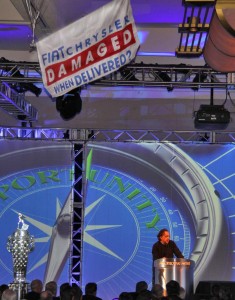
Chrysler CEO Marchionne's speech, this week, drew several protests, but the executive's big challenge is a planned strike against Fiat.
It’s not always easy keeping people happy when you’re running a car company. For Sergio Marchionne, who heads both the Italian automaker, Fiat, as well as the troubled American car company, Chrysler, it adds up to double-trouble.
The biggest issue, for the moment, is on the European side, where Fiat is facing the threat of a system-wide “warning” strike, on February 3, with workers set to protest plans by the company to shutter a factory in Sicily. Further job actions are hinted at if Fiat refuses to rescind the death sentence for what Marchione has described as the most costly assembly plant in the company’s network.
But the executive hasn’t escaped the angry mobs here in the U.S., either, where he is spending half his time trying to manage Chrysler’s turnaround.
Earlier this week, Marchionne was greeted by two separate protests before delivering a speech to the annual Automotive News World Congress. As the Italian executive was being introduced by AN Publisher Keith Crain, a woman raced to the podium and began screaming about the automaker’s alleged role in her mother’s death in a car accident. It took several security officers to eventually drag her off the stage.
But that only gave cover to another, more subtle protest. Several people entered the grand ballroom at Detroit’s Renaissance Center carrying brightly-colored balloons – some observers wondering if it were perhaps a celebration of the 40th birthday of Chrysler design chief Ralph Gilles. In fact, the helium balloons were quickly released, carrying a protest banner to the ceiling of the ballroom.
It wasn’t at first clear who was responsible, initial attention focusing on the same folks who’d protested the Chrysler and General Motors bailouts outside Cobo Hall during the Detroit Auto Show. It turned out, however, that the protestors – one shouting, “shame,” in vernacular Italian – were upset by Chrysler’s plan to go with non-union car haulers.
While the various U.S. protests were, at most, a bit embarrassing, the strike threat, in Italy, could be much more serious.
The Silician plant, Termini Imerese, requires parts and components to be shipped in, and assembled cars to be loaded on boats before distribution across Europe. According to a well-placed source, that adds about $1500 to the cost of each vehicle. That’s all the more difficult to swallow, for Fiat, considering the overcapacity in the company’s European production network.
There Fiat isn’t alone. According to comments Marchionne made, earlier this week, European automakers, on the whole, have seen capacity utilization tumble to an estimated 65% for 2010. But closing plants has been a nightmare, repeatedly stymied by both labor unions and European governments.
“European manufacturers simply do not close plants,” said the Chrysler/Fiat CEO.
General Motors could face a similar challenge, this year, as it struggles to implement a restructuring of its troubled Opel subsidiary. Not a single German auto assembly plant has closed since World War II, but Opel is said to need to reduce capacity by the equivalent of at least two plants, and to trim its workforce by 10,000.
As part of an aborted plan to sell a controlling stake in Opel, factories outside Germany were on the line, but since halting the proposed sale to partsmaker Magna International, Opel is reportedly looking at two relatively low-efficiency in its headquarters country.
